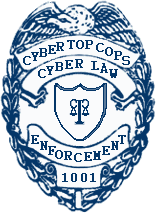Lottery Scams
Browse the Web with Firefox for protection against spyware, hackers, spoofing and phishing scams
Lottery scams are nothing other than information harvesters. The people behind them are identity thieves and they normally ask the you for your contact details like your physical and postal address, telephone and fax numbers, e-mail address, bank account numbers. They also ask for your social security number, passport number, or any type of identification number. Supplying them with your personal information exposes you to the possibilities of identity theft, online fraud, money laundering, spam, viruses, etc.
Some scammers even request money from victims with the lame excuse that they need the money to cover the administrative costs of processing the release of your prize. There is no prize and you will never see your money again if you pay them this administrative fee. This is a common characteristic of the 419 Nigerian scam.
Here are a few pointers to help you identify this type of scam:
- Many of these e-mails pretend to be from a lottery programme run by Microsoft, Yahoo!, BMW or other large international corporations. These companies do not run a lottery programmes, so this should already be a clear indication that it is a scam.
- The e-mails are always addressed to "Dear Lucky Winner", "Dear Winner", or "Dear Sir/Madam" which is kind of strange, because if they have drawn your e-mail address from an e-mail database, why don't they have your name? The answer is simple, they drew your e-mail address from a spam database.
- You can never win a lottery if you never entered one.
- Even if you entered a lottery, you should be in the possession of a ticket, supplied by the lottery program. This ticket must correspond to the numbers supplied in the e-mail. If the e-mail has no ticket numbers you can be certain it is a scam.
- The collections officer or the person you need to contact to claim your prize, seldom has a corporate e-mail address. It is most of the times a free e-mail address either from Yahoo!, MSN (Hotmail), AOL/AIM, Netscape or any other free e-mail service. We have never seen scammers using a corporate e-mail address, but these people are clever and they might just as well use a corporate, legitimate looking e-mail address to scam you. So it is not a rule of thumb that they always use free e-mail services.
- The e-mail address they sent the e-mail from and the e-mail address you need to reply to is seldom the same. Professional institutes will never use a confusing practice like this when they contact prize winners to claim their prize.
- If they request money to release the prize, you can know for certain that it is a scam. Since when do you need to pay something to claim a prize? It beats the whole concept of any competition, winning is free and claiming your prize should be free. When you need to pay something to get something it is no longer a prize, it becomes a moneymaking scheme and in this case an illegal one.
Below are links to copies of typical Lottery scam e-mails. Note that the original formatting of the e-mails was preserved and this is more or less how they look when you open them. We [DELETED] personal names, e-mail addresses and telephone numbers in the examples below for security reasons and because scammers often use different information in each e-mail.
- BMW Lottery Board/Department Lottery Scam
- Global Sweepstakes Lucky Day Annual Lottery Promotions Scam
- Guinness Stout Lottery Scam
- Loteria Primitiva International Prize Award Lottery Scam
- MasterCard Promo Lottery Scam
- Microsoft Lottery Scam
- Online Cyber Lottery Scam
- Seat Automobile Promotion Lottery Scam
- Staatslotterij International Promo Programme Lottery Scam
- UEFA League Promotions Scam
- UK National Lottery Scam
- Vodafone Lottery Scam







